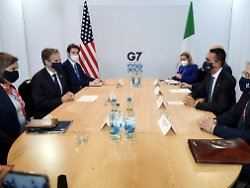Sunday December 12th 2021
Russia, China, Iran
G7 ministers agree on crisis issues
In her first week of office, the new Foreign Minister Baerbock can already announce positive news: The G7 ministers are in agreement on crisis issues such as the Ukraine conflict, the Iranian nuclear program and dealing with China. A hard line is required – but also a willingness to engage in dialogue.
The foreign ministers of the leading Western economic powers (G7) have agreed on a common signal for freedom and democracy vis-à-vis Russia, China and Iran. This was announced by the new German Foreign Minister Annalena Baerbock after discussions with her colleagues in Liverpool. The Green politician also emphasized that the G7 does not act as a group that “works against someone, but stands up for something”. The final declaration will be published on Sunday after the two-day deliberations have ended.
At the turn of the year, Germany will take over from Great Britain as chairman of the G7, which includes France and the USA, Italy, Japan and Canada. Baerbock emphasized that the cooperation is based on the common understanding of a global economy that is based on the values of democracy, the rule of law and human rights and is interested in fair world trade and fair cooperation.
Baerbock for dialogue with Russia
Against the background of the worsening situation on the border between Ukraine and Russia, Baerbock said the group agreed that there should be no border shift in Europe. It is a clear common position “that crossing this limit would have enormous political and economic consequences”. The signal should go out from Liverpool that “we are clearly committed to multilateralism and, above all, to international law”.
In response to a reporter question in Wilmington on Saturday, US President Joe Biden repeated his threat of the past few days: Should Russia invade Ukraine, the consequences for the Russian economy would be “devastating”. Baerbock said that despite the tense situation, all measures should be taken to return to dialogue with Russia. She named the Normandy format of Germany, France, Ukraine and Russia as well as the Organization for Security and Cooperation in Europe as possible negotiation platforms. The goal is de-escalation on the Russian-Ukrainian border.
There was unanimous agreement in the round that China “is a partner in all the global issues that concern us around the world, but also competitors and system rivals,” said Baerbock. One wants to achieve cooperation with China under fair conditions and above all with respect for human rights.
“We are running out of time at this point”
In view of the faltering nuclear talks with Iran in Vienna, Baerbock said that the Iranians’ offer meant falling behind in the negotiations by six months. Iran has lost a lot of trust. A diplomatic solution is still being worked at full speed, but: “We are running out of time at this point.” In Liverpool, however, the demand that Iran must return to the old negotiating status had also become clear. The negotiations are “not an end in themselves, but prevent Iran from getting the resources and know-how to build an atomic bomb.”
In the deliberations, Baerbock also presented the priorities of the foreign policy part of the German G7 Presidency. The first point she mentioned was the link between the climate crisis and security policy. Climate change is a strong driver of conflicts around the world. In addition, Germany wants to strengthen forward-looking multilateralism so that international action does not only take place when crises are already there. During the G7 presidency, Germany also wants to work to make democracies more resilient, for example against cyber attacks or other attacks.
More solidarity with vaccine distribution
The G7 ministers also wanted to discuss how the worsening humanitarian crisis in Afghanistan can be tackled. The hostess, British Foreign Minister Liz Truss, wanted to pledge 75 million pounds (almost 88 million euros) in British emergency aid for Afghanistan at the meeting. According to the British Foreign Office, this will support 1.8 million Afghans with life-saving aid this winter, for example with food, water, shelter and emergency health care. According to this, this aid is provided by UN organizations such as the World Food Program and other trusted partners.
The foreign ministers also wanted to discuss the global distribution of corona vaccines in Liverpool, partly together with the G7 development ministers. The new head of department, Svenja Schulze, wanted to travel from Germany. As the richest countries in the world, the G7 have “a special responsibility in dealing with the corona pandemic and climate change, and they must show global solidarity with the poorest,” she urged before their talks. In the long term, only fair global vaccine distribution will help against the corona pandemic.
Baerbock wanted to fly on to Brussels on Sunday afternoon. A meeting with EU Commission President Ursula von der Leyen was planned there in the evening. This Monday, the minister wants to take part in an EU Foreign Ministers’ Council in the Belgian capital for the first time.
